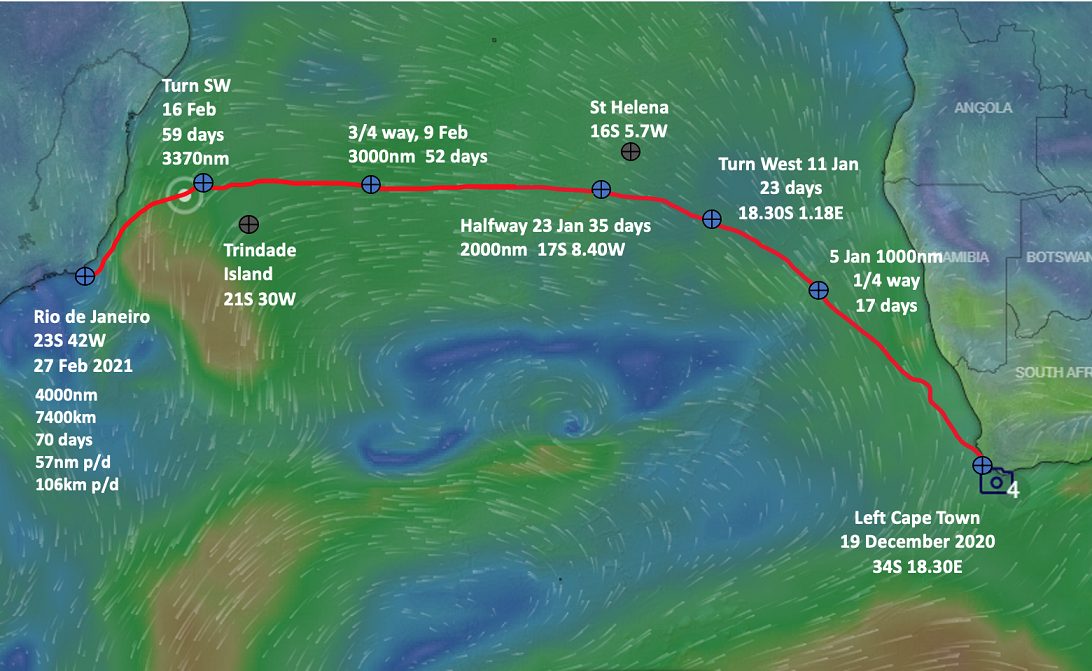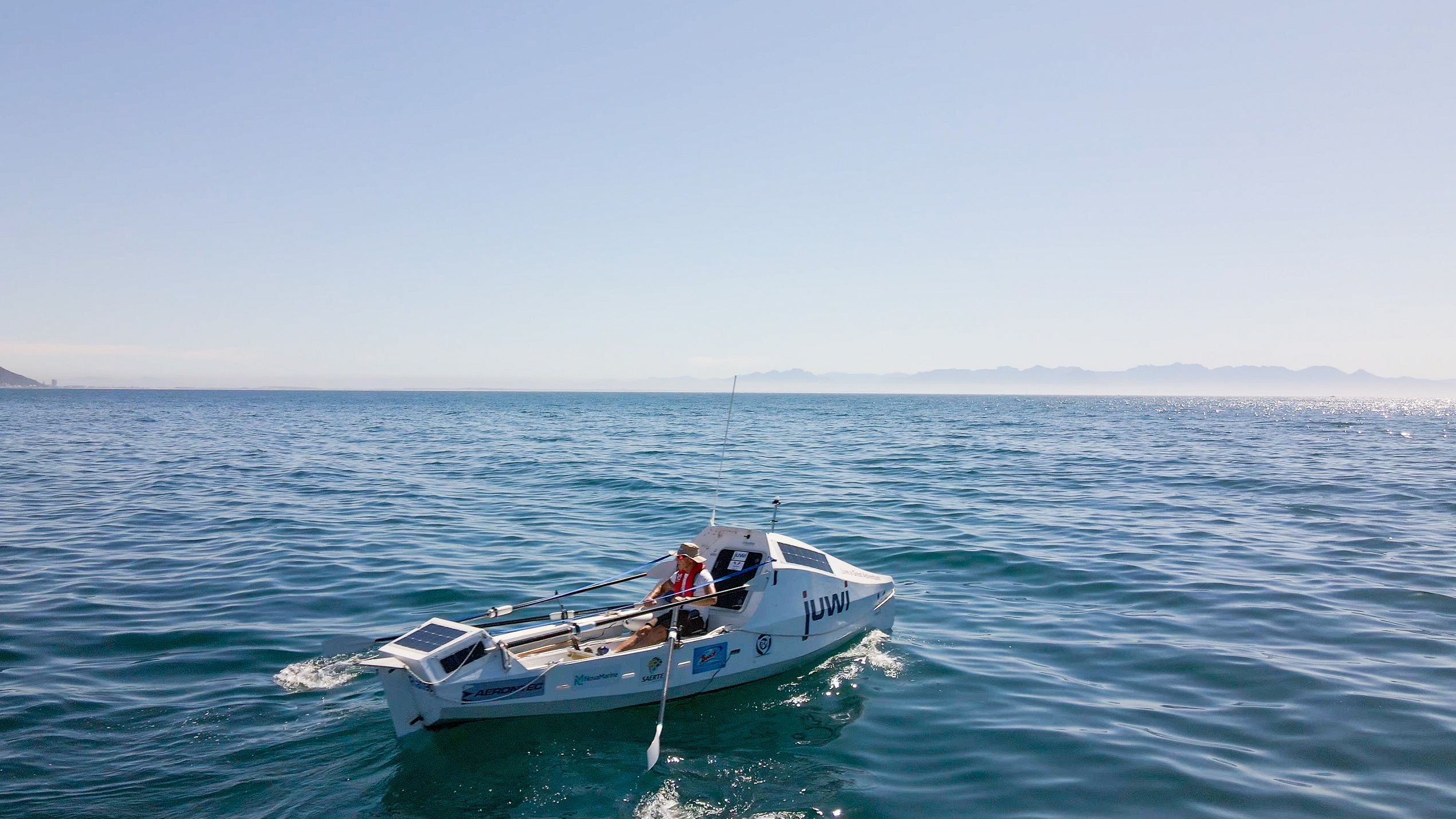Burger, chips and a Coke for Zirk Botha – the South African who just finished a World Record solo row from Cape Town to Rio de Janeiro.
Cabo Frio, Rio de Janeiro (01 March 2021) – Rowing for the planet and sustainable development, extreme adventurer and ex-naval officer, Zirk Botha (59 years old) completed his solo transatlantic ocean crossing on his boat ‘Ratel’, from South Africa to Brazil in a world record of 70 days, over a total distance of 7200km or 4000 nautical miles (nm).
After leaving Cape Town on 19 December 2020, Botha rowed into the small bay of Buzios just north of Rio de Janeiro, at 03:45 on 27 February 2021, South African Time / 22:45, 26 February 2021, Brazilian time.
After recuperating in Buzios on Saturday, he rowed on to Cabo Frio on Sunday, to complete his voyage and to receive a massive Brazilian welcome at the original Rio de Janeiro Yacht Club, better known as”Iate Clube do Rio de Janeiro”. Escorted in by a flotilla of boats and welcomed by locals, dignitaries and media, Botha was the toast of the town. Ironically, none of Zirk’s South African family or friends could be at the finish, as South Africans are currently blocked from entering Brazil due to Covid-19 related travel restrictions.
In completing the crossing, Botha set world records as the first person to row a south transatlantic route alone and unsupported by any safety craft, and for the fastest row from Cape to Rio. A similar route was previously completed by South African duo Wayne Robertson and Braam Malherbe, in 92 days, in 2017.
Stepping off his boat “Ratel” onto Brazilian soil for the first time in Buzios after months at sea, Botha described his legs as very wobbly and the experience as totally overwhelming.
“When I started planning this trip two years ago people said I was mad. I want to encourage everyone to dream big, do big and never to allow anyone to discourage you. Life is a great adventure.”
On his row, Botha had to deal with the multiple challenges of wild seas, sleep deprivation, isolation, and the risk of encountering ships.
“While I had near perfect weather conditions to facilitate a record breaking crossing, it has been intense, with only two calm days over the whole crossing. The relentless nature of the weather has been physically and mentally draining. I wasn’t prepared for that type of challenge.”
Botha says he’s most looking forward to eating fresh, unprocessed food. He’s lost a significant amount of weight, an estimated 10kg, and is struggling to consume enough food to match his energy requirements now.
“The first thing I did on arrival was to eat a burger, chips and a Coke, which I was craving and it tasted really amazing. I know I need to start rebuilding my body now, with healthy fresh food. I am physically exhausted.”
Brazilian locals at the Rio de Janeiro Yacht Club in Cabo Frio are preparing for a hero’s welcome. Ironically, none of Zirk’s South African friends and family can be at the finish as South Africans are currently blocked from entering Brazil due to Covid-19 related travel restrictions.

The South African Consul General in Brazil, Tinyiko Kumalo, congratulated Botha, saying, “One can only imagine the challenges you faced and had to overcome during your solo, unsupported journey as you navigated through the rough Atlantic Ocean for many days. What a brave man you are! The nation takes pride in your success. As representatives here in Brazil, we recognize the important role this initiative plays in strengthening the relations between South Africa and Brazil. You are our true hero, for a hero is someone who, in spite of weakness, doubt or not always knowing the answers, goes ahead and overcomes anyway, and a man who lets no obstacle prevents him from pursuing the values he has chosen.”
A world record row
Botha has set a number of records with the row.
“I completed a solo row across a route that is extremely remote. I hadno safety back up boat as in organised races.
“Other SA solo rowers have done shorter transatlantic crossings in organised races such as the Talisker or its predecessor, the Woodvale challenge. However, no other solo rower has done an unsupported transatlantic row of this magnitude, over 4000nm, which has included coping with the Cape of Storms. “I am waiting for verification, but I believe this is the longest distance rowed by a South African solo rower on any route.”
“As a solo rower I had to deal with all physical, mental and emotional challenges without support or relief. I had to navigate 24/7with noone else to keep a visual lookout for ships or changes in weather conditions while I slept. I could not sleep for long periods, so I was sleep deprived. When I was not rowing I had to desalinate water, clean the hull and do general boat maintenance, besides laundry, which also impacted on the time I had available to rest.
Botha explains: “Although I have been generously sponsored by juwi and other sponsors for part of my costs and equipment, I had no big sponsorship initially that enabled me to buy a fully equipped ocean rowing boat from the outset. I had to teach myself how to do epoxy work and I built the boat in my garden. I fitted all equipment myself and did all the electrical wiring. Also, something I had to teach myself to do.”
Rowing for a sustainable future
Sponsored by juwi Renewable Energies, Botha completed the extraordinary feat in support of sustainable development and to promote renewable energy as a solution to environmental issues and climate change.
“I wanted to use #Row2Rio2020 to spotlight the impact of fossil fuels and irresponsible consumerism on the planet, which will be the home of our children and future generations. Renewable energies are essential to a sustainable future.”
“During my entire row I was 100% self-sustaining. This provides a perfect showcase to support the message that 100% renewable energy is the solution. I am totally reliant on solar panels and solar-charged batteries as the source of electricity for my water maker (desalinator), auto-pilot, safety equipment, radio and satellite communications equipment.”
Richard Doyle, CEO of juwi Renewable Energies, sponsors of the trip, applauded Botha: “What Zirk has done is remarkable from an individual perspective. However, it is really symbolic because it is a proxy for the greater effort ,we all need to make both individually and collectively if we are to realise sustainability.”
“Renewable energy made up 28% of the global total last year, up 2% on the previous year. There is a steady shift investment appetite away from fossil fuels and this percentage will only increase.”
“juwi’s vision is 100% renewable energy and it is increasingly clear that many businesses can get there with energy management and storage. Zirk is a mini-example of this with the sun having provided all of the navigation, communications and other electronic functions for his trip,” said Doyle.
About the boat
Botha named his boat ‘Ratel’ which is the Afrikaans word for honey badger, an animal known for its courage and tenacity, and it has certainly lived up to its name.
“Ratel was designed for rough weather and sea conditions. She is so stable, and she gets up to speed and maintains momentum well.”
The current norm is for ocean rowing boats to be built from marine plywood or in a fibreglass and epoxy mould. Ratel differs from this in that she is built on a design by Phil Morrison using closed-cell foam laid up with fibreglass and epoxy resin.

The specific design incorporates honeycomb construction principles which ultimately makes it very strong when considering it is super light.
“Before I started fitting hatches and equipment I could lift and turn Ratel by myself with one end on the cradle. With all equipment, spares and food loaded, she weighs maximum 550kgs. With a length of 6.5m and beam of 1.62m she is super light,” said Botha.
“To operate my systems I have 2 x 12V batteries connected in parallel with a combined 200aH capacity. These are deep cycle batteries suited for charging with solar panels. I chose Solbian flexible solar panels because of their good track record on yachts and boats. With a peak capacity of 276 watts at 46 volts, they deliver maximum half of that owing to be positioned at various angles to cater for morning, midday and afternoon sun. They have consistently delivered even on overcast days and as such my batteries have been fully charged every day at sunset.
“Fitted onboard Ratel is a desalinator that provides my fresh water. The Eco Systems Splash unit can make 16l of fresh water per hour. It runs off 12 volts and requires a 16amp supply.
Besides the desalinator my most important unit is my VHF radio equipped with a GPS, AIS and DSC facility. The AIS allows me to get early warning of ships in my vicinity whilst the DSC allows me to communicate with them similar to as by SMS. I am also able to call ships on normal maritime channels.
Sources: Zirk Botha
Don’t ever miss the Good Things. Download the Good Things Guy App now on Apple or Google.
Have something to add to this story? Please share it in the comments or follow GoodThingsGuy on Facebook & Twitter to keep up to date with good news as it happens, or share your good news with us by clicking here.
Click the link below to listen to the Good Things Guy Podcast with Brent Lindeque – South Africa’s very own Good Things Guy. He’s on a mission to change what the world pays attention to, and he truly believes that there’s good news all around us. In the Good Things Guy podcast, you’ll meet these everyday heroes & hear their incredible stories:
Or watch an episode of Good Things TV below, a show created to offer South Africans balance in a world with what feels like constant bad news. We’re here to remind you that there are still so many good things happening in South Africa & we’ll hopefully leave you feeling a little more proudly South African.
Zirk Botha

